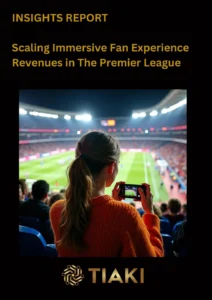Protecting the Digital Fan Goldmine: Safeguarding Immersive Revenue in the Age of Al Cybercrime

The Digital Goldmine and the Looming Threat
Global football club powerhouses such as Manchester United, Manchester City, PSG, Real Madrid, and Barcelona are more than just sports teams; they’re cultural behemoths embedded deep in our society’s fabric and pervasive in our media channels almost every day.
Their data assets, boasting hundreds of millions of followers across social media, are a potential goldmine, representing a direct line to imminent digital revenues. This fan data, encompassing personal preferences, engagement patterns, and propensity-to-buy insights, is the future lifeblood of modern sports organizations. Consequently, leading football clubs are now shifting their ambitions toward a dynamic retailing focus, personalized content creation, and data monetization realization.
However, this digital goldmine is a prime target for increasingly sophisticated cybercriminals. With the rise of AI, these adversaries are no longer limited to simple phishing attacks or brute-force methods. They’re leveraging artificial intelligence to craft highly targeted, automated attacks that can penetrate even the most robust defenses.
This blog post delves into the specific attack techniques an AI-powered cybercriminal might employ to steal fan data from these global football brands. We’ll also explore the critical importance of understanding these threats for football club C-suite executives, who are now accelerating and scaling their digital monetization strategies. Recognizing that best-practice cybersecurity is not a reactive cost burden to the business but an explicit, proactive revenue enabler that is non-negotiable.
AI-Powered Attack Techniques – Exploiting the Digital Ecosystem
Here are some potential attack vectors that AI-powered cybercriminals will deploy against high-profile sports properties:
AI-Driven Phishing and Social Engineering:
- AI can analyze vast amounts of social media data to create highly personalized phishing emails and messages. These messages can mimic the tone and style of official club communications, making them incredibly convincing.
- AI-powered chatbots can engage fans in seemingly natural conversations, subtly extracting personal information or directing them to malicious websites.
- Deepfake technology can be used to create realistic video or audio messages featuring club players or officials, further enhancing the effectiveness of social engineering attacks.
Data Poisoning and Model Manipulation:
- Clubs utilize AI for various purposes, including fan engagement, marketing, and ticket pricing. Attackers can inject malicious data into these AI models, corrupting their outputs.
- By poisoning fan sentiment analysis models, attackers can manipulate public perception of the club or its players, potentially causing reputational damage.
- By compromising recommendation engines, they could trick fans into clicking malicious links or downloading infected apps.
Automated Account Takeover and Credential Stuffing:
- AI can automate credential stuffing attacks, rapidly testing stolen usernames and passwords against fan accounts across various platforms.
- AI can analyze patterns in password creation and predict common variations, increasing the success rate of these attacks.
- AI can be used to bypass multi-factor authentication by analyzing patterns in how users respond to MFA challenges.
API Exploitation and Data Scraping:
- Clubs often use APIs to integrate various services and platforms. Attackers can exploit vulnerabilities in these APIs to gain unauthorized access to fan data.
- AI-powered web scraping tools can extract massive amounts of data from club websites and social media profiles, even when traditional anti-scraping measures are in place.
Malware and Zero-Day Exploits:
- AI can be used to create polymorphic malware that changes its signature to evade detection.
- AI can find and exploit Zero-Day vulnerabilities in applications and systems used by football clubs before these vulnerabilities are known to the vendor.
The Scale of the Threat: Data from 2.3 Billion Football Fans at Risk at the Top 10 Football Clubs in Europe
The sheer scale of the fan base — 100 to 200+ million followers per club — quickly scales to over 2.3 billion football fans at the top 10 European football clubs. This amplifies the potential damage of a successful attack. Cybercriminals will target lucrative, rich pickings at the ‘soft underbelly’ of high-profile global sporting brands. A data breach involving such a massive amount of personal information can have devastating consequences.
Key Risks:
- Loss of Fan Trust: Fans who entrust their data to the club expect it to be protected. A breach shatters this trust, potentially leading to a mass exodus of followers and a significant decline in engagement.
- Reputational Damage: The brand value of these clubs is built on their reputation for integrity and excellence. A data breach can severely tarnish this reputation, impacting sponsorships, merchandise sales, and overall brand perception.
- Financial Losses: Data breaches can result in substantial financial losses due to regulatory fines, legal fees, and the cost of remediation.
- Ecosystem Partner Damage: Many clubs rely on partnerships with other organizations. If a breach occurs, those partner relationships can be damaged.
- Investor Confidence: A data breach will cause investors to lose confidence in the club’s ability to manage its digital assets.
Immersive Fan Experiences: The Pivotal Shift to New Digital Revenue Streams
TIAKI predicts that digital immersive revenues in European football will start to be realized in 2025 with proven technology offerings from North America. This shift will reduce dependency on matchday, broadcasting, and commercial sponsorship revenues.
Within two years, this transformation could fundamentally change the revenue portfolio mix at large European football clubs—provided that first-party data is effectively harnessed, secured, and monetized.
However, for monetization to be realized, first-party data — consisting of 100 million+ social media followers per club—must be resiliently secure against AI-powered cybercriminals.

In our separate Insights Report, Scaling Immersive Fan Experience Revenues in the Premier League – TIAKI, we highlight the potential digital immersive revenues that could be realized at the Top 9 Premier League clubs in the 2025–2026 season.
We compare 2024 revenue actuals with forecasted immersive revenues, based on 20 immersive fan experience applications that charge a ‘season ticket’ fee. The potential is ground breaking with just a 0.5–1% conversion of social media followers.
The C-Suite Imperative – Integrating Data, AI, and Cybersecurity to Scale Digital Immersive Revenues
For C-suite executives, understanding these AI-powered threats is not just a technical concern; it’s a strategic imperative. As football clubs accelerate their digital monetization efforts, the C-suite must take direct ownership of integrating data, AI, and cybersecurity.
Key Strategic Areas
Data Strategy:
- Establish clear data governance policies and procedures.
- Implement robust data encryption and access control measures.
- Conduct regular data audits to identify and mitigate vulnerabilities.
- Implement data minimization strategies.
AI Strategy:
- Adopt a security-by-design approach to AI development.
- Implement robust testing and validation procedures for AI models.
- Continuously monitor AI models for anomalies and potential threats.
- Create a clear understanding of the AI attack surface.
Cybersecurity Strategy:
- Invest in advanced threat detection and prevention technologies.
- Conduct regular security assessments and penetration testing.
- Provide comprehensive cybersecurity training for employees and fans.
- Implement a robust incident response plan.
- Foster a digital security culture.
Cross-Functional Collaboration:
- Ensure that Business, IT, Marketing, Legal, and other departments work together across the sporting organization on security issues.
Building a Resilient Digital Fortress – Protecting the Future of Football
The future of global football clubs lies in their ability to effectively leverage and protect their digital assets. To achieve this, they must build a resilient digital fortress capable of withstanding AI-powered cyberattacks, which will intensify from 2025 onwards.
By prioritizing data security, adopting a proactive cybersecurity posture, and fostering a culture of security awareness, clubs can:
– Protect fan data
– Preserve brand reputation
– Ensure the long-term success of their digital monetization strategies.
Time to Act
The threat is real, and the stakes are high. By understanding the tactics of AI-powered cybercriminals and taking decisive action, global football clubs can safeguard their digital goldmine and continue to connect with fans worldwide.
The time to take decisive action is now, before the whistle blows on a devastating data breach.
About the Author:

David Andrew
Founder & Managing Partner
www.tiaki.ai
david.andrew@tiaki.ai


David is the Founder & Managing Partner at TIAKI, a niche consulting practice helping executive leadership in sport make confident, informed decisions on their risks, investments and business outcomes powered by secure ‘data-at-scale’. He collaborates with bold and determined leaders in the sports ecosystem to define their data, AI and cybersecurity strategies to deliver sustainable value.
David’s vision for TIAKI is to empower sports franchise CEOs, leadership teams, sports media broadcasters and investors in the global sports industry with strategic advisory frameworks to deliver secure, pioneering digital fan experiences and new ecosystem business models to achieve breakthrough returns.
David has over 20 years of strategy and technology enabled business transformation experience, providing consulting expertise in cloud native technologies, data strategy, digital business enablement and cybersecurity strategy. He is passionate about helping talented leadership teams succeed in securely growing their differentiated business models in the data-driven, digital sports economy.
Based in Stockholm, David previously worked for IBM Consulting, EY, Accenture Strategy and Orange Business. He studied Chemistry at Durham University and holds an MBA from Trinity College, Dublin Business School.
Copyright © 2025 TIAKI.
All rights reserved. TIAKI and its logo are registered trademarks of TIAKI.
Search
